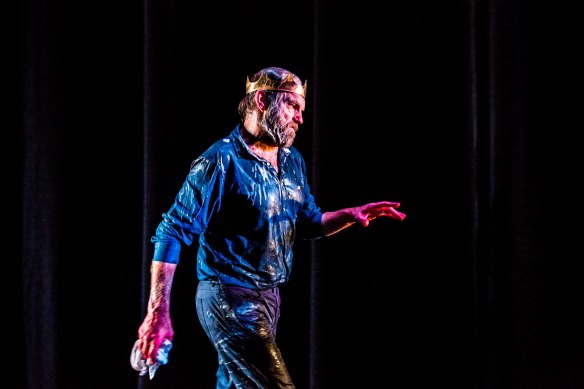Wharf Theatre, January 19

Back: Robert Menzies, Sarah Peirse, Anthony Taufa. Front: Liam Nunan, Rarriwuy Hick and Zindzi Okenyo. Photo: Lisa Tomasetti
Louis Nowra’s epic play The Golden Age hasn’t been staged professionally in Sydney since 1987, following its Melbourne premiere two years earlier. This stunning Sydney Theatre Company production, directed by Kip Williams, confirms that it is an Australian classic and as relevant as ever.
Thrillingly ambitious in its scope and imagination, the play roams from Hobart to the Tasmanian wilderness to Berlin at the end of World War II.
It begins in 1939. Two young men – Francis (Brandon McClelland), an engineer from a working class background, and his friend Peter (Remy Hii) from a well-to-do Hobart family – hike into the Tasmanian wilderness and discover a lost tribe descended from a motley group of European convicts and settlers, including one actor.
Isolated for 80 years, they have developed their own language and culture but have serious physical and mental disorders because of inbreeding. Realising that “the circle is burst” and they have no future, their leader Queenie Ayre (Sarah Peirse) decides they will return to civilisation with Francis and Peter.
However, the government is concerned that their genetic problems will be used as proof of Nazi propaganda and insists on putting them in an asylum until the end of the war.
Nowra vividly evokes the world of the tribe, inventing a muscular language drawn from Cockney, Irish, 1840s convict slang and bawdy verses. At first we have little idea what they’re saying but as some of it is explained and our ear attunes, we begin to decipher meaning. He also folds Greek drama and Shakespeare into the mix of the play.
The Golden Age takes an unflinching look at Australia’s colonial past and culture of ‘she’ll be right’ indifference, articulated in a particularly passionate speech by Francis. Themes include the destruction of one culture by another, what constitutes civilisation, war, class and the search for love, identity and belonging.
At its heart is the touching love story between Francis and Betsheb (Rarriwuy Hick), a young woman from the tribe, who are separated during the war years when Francis and Peter enlist and are sent to Europe, but who offer a glimpse of optimism amid the tragedy.
Williams’ production unfolds with cinematic fluidity on David Fleischer’s set, dominated by a huge mound of earth. It’s not particularly attractive and works better in some scenes than others. Initially, it seems like a rather drab, arid rendering of the Tasmanian wilderness, even with the odd leafy branch thrown onto it. It also looks odd to have an elegant dinner party scene in Hobart next to it. But it gradually seems to accrue meaning, symbolising the harshness of the story and the intermingling of the characters’ fates as the earth is paddled around the stage.
Fleischer’s excellent costuming feels very authentic. The production is beautifully lit by Damien Cooper, while Max Lyandvert’s sound is richly evocative.
It’s terrific to see such colour-blind casting, with actors from a number of different backgrounds, most of which simply ‘is’. Having Indigenous actor Ursula Yovich as the aristocratic, rather cold Elizabeth Archer, who utters sentiments such as “What a pathetic group they look, like those Aboriginals in shanty towns”, meanwhile, feels deliberately provocative and heightens the discomfort of such lines.
Among a strong ensemble, Hick shines as Betsheb, capturing her inquisitive, high-spirited, wild nature. Peirse is compelling as Ayre, exuding a natural authority as well as her desperation to protect the tribe and its heritage. Liam Nunan’s physicality as the crippled Stef is superb and McClelland is a passionate Francis. Robert Menzies also excels as combative tribesman Melorne and as Peter’s father, Doctor Archer, who becomes obsessed with the tribe.
Complex, challenging and wildly theatrical, The Golden Age has a haunting, dreamlike quality yet at the same time it feels painfully, movingly real.
The Golden Age plays at Wharf I until February 20. Bookings: www.sydneytheatre.com.au or 02 9250 1777
A version of this review ran in the Sunday Telegraph on January 24











